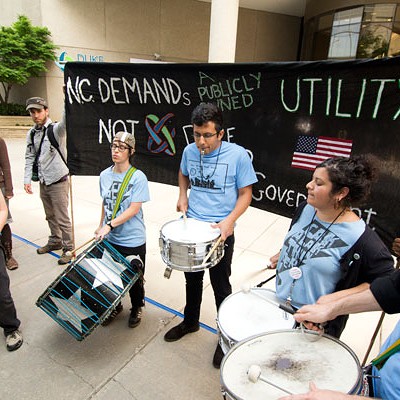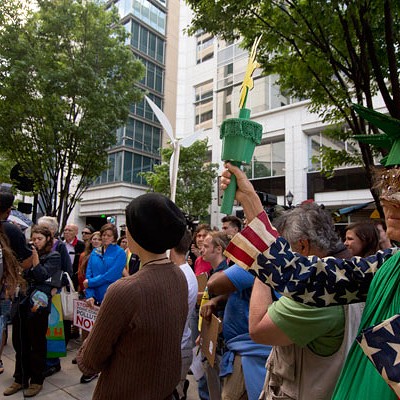Environmentalists got the chance to speak to Duke Energy CEO Lynn Good this morning at the company's shareholder's meeting, where minor outbursts peppered an otherwise dry gathering.
But some who spoke said their comments fell on deaf ears, as Good relied on canned responses to questions mostly about coal ash.
Good hosted a Q&A session with shareholders and their representatives for about an hour at the end of the meeting. She took questions and comments from 16 people in the crowd and answered all of them well under the two-minute limit she had given herself and speakers. From clean up of February's Dan River spill in Eden, North Carolina, to moving Duke's 33 coal ash basins that dot the state, coal ash coated many of the questions.
When asked if the company had details about when the basins would be cleaned, Good referred to an open letter she penned to the state in March following the Dan River spill in which she called each ash basin "unique" and requiring "complex measures that will take time" to assess. She touted Duke's response to the crisis in the Dan River, the third largest coal ash spill in United States history, calling it fast, and repeating that drinking water was never contaminated.
"She was well prepared with stock answers and didn't offer much additional new substance," said Donna Lisenby, former Catawba Riverkeeper who now works as a global coal campaign coordinator for the Waterkeeper Alliance. Lisenby spoke to Good about taking one of her predecessors at Duke Energy, Ruth Shaw, out on the Catawba River a decade ago in a canoe, and asked if Good would consider doing the same.
After Good danced around the question by making jokes about preferring a kayak and needing a life preserver, Lisenby approached the stage and made Good shake her hand as a promise to join her on the river and Mountain Island Lake, where most of Charlotte's drinking water comes from and where some Duke coal ash ponds sit unlined offshore.
Before the Q&A, shareholders voted on a number of items, the most controversial of which was a request that the company provide the board of directors a semiannual report disclosing its political contributions. Had the item passed, it would have required the report publish on Duke Energy's website.
Another point of contention in the meeting involved the order of business; directors were elected and amendments passed before, not after, discussion. When a representative speaking on behalf of a group representing 3.9 million shares of the company spoke out against the nomination of four people to the board, the vote had already passed.
"In what democratic body do you have the vote before you discuss the issues?" said Peter MacDowell, a shareholder who attended the meeting. "This wasn't a utility stockholder's meeting, this was a futility stockholder's meeting. It was a done deal."
MacDowell stood up in the meeting to voice his concerns with the order of business while the vote, which lasted only a few minutes, was happening. He was told to sit down, and when he refused, he was told to leave by security. He looked toward the guard and said, "I will not leave for asking a question," and sat down in his seat, where he remained for the entirety of the meeting.
After the meeting, MacDowell said he felt unsure that anything good had come from it. "There were more institutional stockholders raising serious questions than ever before, [Duke Energy is] in a weaker position than ever before. The question is: was there any evidence of them stepping up to do the right thing? No," he said.
Kelly Martin, working with the Sierra Club's new Beyond Coal campaign, was happy that so many people were able to voice their concerns directly to the highest executive at Duke and hopes that this can be the starting point of a better relationship between environmental organizations and Duke Energy.
"We clearly made the point that we want a future with less fossil fuels and more clean energy and people want a more robust plan for cleaning up coal ash," Martin said. "I always think it's a positive thing when advocates and concerned citizens have the opportunity to talk directly to leadership. It's yet to be seen how seriously they'll take our considerations and what they'll actually do."
Security removed Nick Wood, organizing director of environmental non-profit NC WARN, after he objected to the meeting's agenda minutes after the meeting had begun. When Wood noticed that the Q&A, the only chance for guests to speak, was the very last order of business, he rose to his feet and loudly stated "Point of order!" before being tapped on the arm by a security guard and told to leave the building.
Wood stood outside of the Duke Energy headquarters with protesters who had been outside chanting and giving stump speeches throughout the morning. "I came into the meeting wanting to ask serious questions of Duke Energy," he said. "I should have the right to make a comment about a proposal that is on the agenda at their legally required shareholder's meeting."









